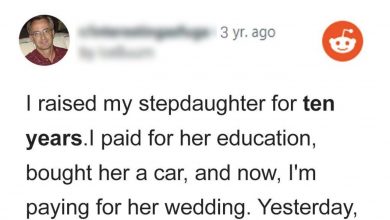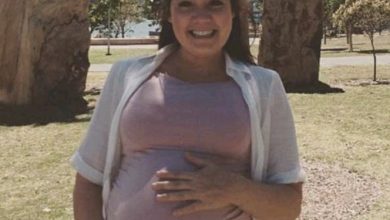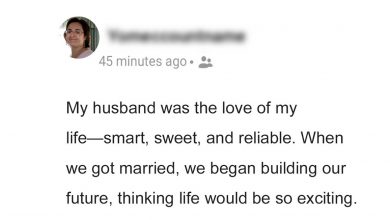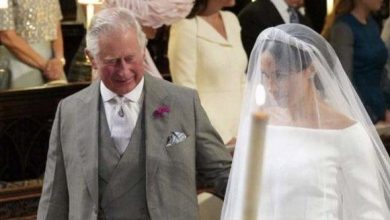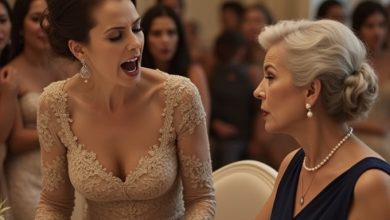“She Left Me a USB Before She Died. When I Played It at Her Funeral, Everyone Heard His Darkest Secret”
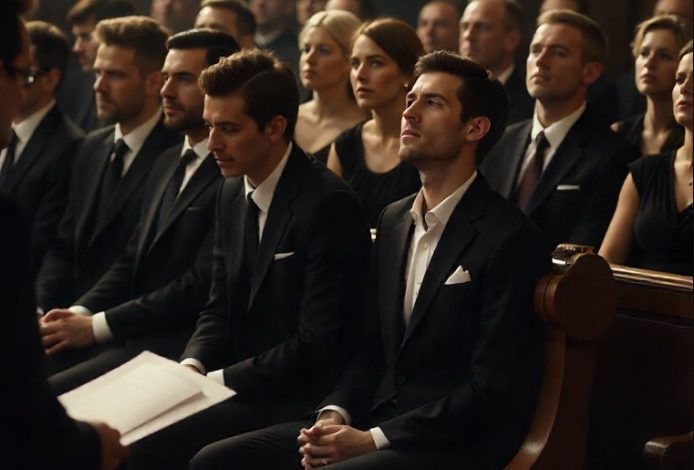
At my daughter’s funeral, my son-in-law wept. He looked broken, his head bowed, his shoulders shaking. No one knew that her final gift to me had not been flowers, or a letter, but a small USB drive. When it came time for me to give the eulogy, I did not speak. I simply gave a signal and let the recording play. The moment his voice filled the room, the crowd froze.
Grief is a thief. It doesn’t just take away the person you love—it robs you of air, of balance, of the will to move forward. It clouds your thoughts, making the world heavy and unreal. When my only daughter, Clara, died, it felt like my soul had been torn from me. She was just thirty-five years old, a brilliant journalist with a fearless spirit. She had made her career by exposing lies and digging into corruption, unafraid of the powerful enemies she made. Her life had shone so brightly, and then suddenly—gone. Her death was labeled as the result of a sudden, aggressive illness. Doctors spoke of autoimmune disease, something unstoppable. But I knew there was more.
In the days following her passing, I drifted through life like a ghost. People came with casseroles, flowers, and pity in their eyes. My son-in-law, Dr. Marcus Thorne, played his role well. He was admired, respected, a charming oncologist known in medical circles. To everyone else, he looked like a man crushed by tragedy. He organized the funeral, accepted condolences with trembling hands, and spoke softly of Clara with tears brimming in his eyes. He seemed like a grieving husband who had lost the love of his life.
But he was not.
The morning after Clara died, an envelope came in the mail. The postmark showed it had been sent from a post office near the hospital two days earlier. My hands shook as I tore it open. Inside was not a letter, not a goodbye, but a small USB stick and a Post-it note with Clara’s handwriting. The letters were shaky, uneven, the last trace of her strength.
“Dad, if you’re reading this, don’t let him get away with it. Listen.”
My heart pounded. My legs felt weak. I rushed to my study and plugged the drive into my laptop. One file appeared on the screen: Final_Interview.mp3. My throat tightened as I clicked play.
Clara’s voice filled the room. It was faint, weak, nothing like the powerful, confident voice I knew. “Say it again, Marcus,” she whispered. “I need to understand. I need to hear it again. Why?”
And then his voice answered. It wasn’t the gentle, reassuring voice he used in public. This was another side of him—cold, sharp, and filled with cruelty. “Because you wouldn’t let it go, Clara. You had to dig. You had to expose me. This research is my entire life. Your so-called ‘article’ would have destroyed me. I couldn’t allow that.”
Clara coughed weakly. “What did you put in my IV?”
“Something beautiful,” Marcus said, his tone almost proud. “A custom toxin, designed to leave no trace. It destroys the body from the inside, organ by organ. To the outside world, it looks like a sudden autoimmune failure. A tragic disease. Everyone will pity us. They’ll see me as the devoted husband who stood by your side until the end. In a few hours, it will all be over. My legacy will be untouchable.”
I sank into my chair, clutching the desk so hard my knuckles turned white. A sound tore from my throat—half scream, half sob. My daughter had been murdered. And her killer was sitting in the next room, shaking hands, receiving sympathy.
Marcus believed he was untouchable. But he had underestimated Clara. Even in her last hours, she was still a reporter. She had gathered the evidence, made sure it would reach me. She gave me the weapon I needed.
At first, I wanted to call the police immediately. To hand them the USB and let the law take him down. But then I remembered Clara—her fire, her dedication. She had spent her life dragging the truth into the light for everyone to see. She wouldn’t want her story buried in some quiet courtroom file. She would want the world to hear it.
So I made a decision. Justice would not be hidden. It would happen on the largest stage Marcus himself had prepared—her funeral.
The chapel was filled to capacity that day. Hospital directors, wealthy donors, colleagues, friends, journalists—they were all there. Marcus had gathered them himself, wanting the audience for his grand performance as the grieving widower. He wanted to be seen, admired, pitied.
He didn’t know that it would be the stage of his downfall.
Before the service began, I approached the young technician managing the audio system. My voice was soft, heavy with grief. “My daughter left something she wanted played. It’s on this USB. When I signal, please play it. From beginning to end. No matter what.”
The technician nodded, his eyes full of sympathy. “Of course, sir. I’ll be ready.”
The funeral began. Prayers were said. People spoke kind words about Clara, her bravery, her brilliance, her kindness. Finally, Marcus walked to the podium. He looked pale, his eyes wet, his shoulders heavy with false sorrow.
“Clara was my everything,” he said, his voice breaking at just the right moments. “She was brilliant, fearless, beautiful. This cruel illness… it came so suddenly. I was by her side until her very last breath.” He lowered his head, covering his face with his hands. The crowd sniffled, tissues pressed to eyes. He was performing perfectly.
Then it was my turn. I walked slowly to the podium, my legs trembling but my heart solid with purpose. I looked at Marcus, sitting in the front row, pretending to share my pain. Our eyes met. His face showed nothing but sympathy.
I said nothing. I only nodded at the technician.
The chapel went silent as the speakers crackled. Then Clara’s voice, frail but clear, filled the room.
“Why, Marcus? Why?”
A wave of confusion swept through the audience. Heads turned, whispers began. Marcus froze, his smile faltering.
And then his own voice, cold and venomous, echoed across the chapel. “Because you wouldn’t let it go. Your exposé would have ruined me. This way is cleaner. A tragic illness. No one will ever know.”
The reaction was instant. Gasps of shock, horrified cries. Faces turned toward Marcus, eyes wide with disbelief and rage.
“No,” he whispered, shaking his head. He tried to stand, but his legs gave out. “No, this is… this is fake!”
But it was too late. The words were clear, undeniable. His own confession, played for everyone he had wanted to impress.
Chaos broke out. People shouted, some stood to leave, others pointed accusing fingers at him. I saw plainclothes officers in the back of the room rise to their feet, moving swiftly down the aisle. Marcus bolted toward the side door, but they were faster.
“Dr. Thorne,” one officer barked, grabbing his arm. “You’re under arrest.”
Right there, in front of Clara’s coffin, Marcus Thorne was handcuffed and dragged out, his face pale, his lips trembling. The voice recording continued to play, every vile word he had spoken echoing through the chapel. The donors, the board members, the journalists—they all heard it. His empire collapsed in that instant.
I stood at the podium, watching. My face was hard, my hands steady. I had kept my promise to my daughter.
Months later, Marcus was convicted—not only for Clara’s murder but for years of fraudulent research. He was sentenced to life without parole. His name, once spoken with admiration, became a symbol of arrogance and betrayal.
As for me, I used Clara’s inheritance and the settlement from lawsuits against the hospital to create the Clara Vance Foundation for Investigative Journalism. Its mission was simple: to fund fearless reporting, the kind my daughter had lived and died for.
A year later, I stood on a different stage. Not a chapel filled with sorrow, but a bright auditorium filled with young journalists eager to change the world. I handed out the first annual Clara Vance Award to a young woman who had just exposed corruption in the pharmaceutical industry.
I leaned into the microphone, my voice steady. “My daughter taught me that truth is the most powerful weapon we have. Even if it’s spoken in a whisper, even if it’s your last breath—it must be heard.”
The room erupted in applause. For the first time since Clara’s death, I felt something close to peace. Her story hadn’t ended in silence. Her voice would echo forever, carried on by those brave enough to follow her path.

